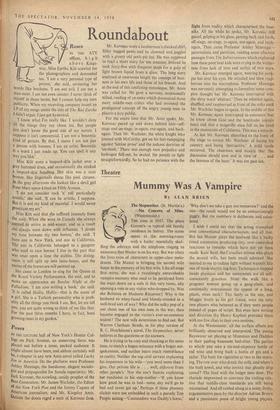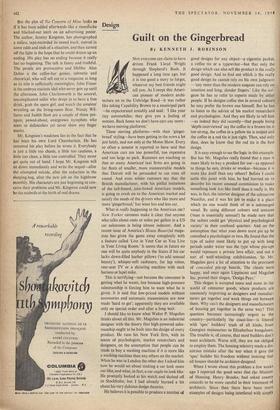Theatre
Mummy Was A Vampire
By ALAN BRIEN The Stepmother. (St. Martin's.) —No Concern of Mine. (Westminster.) THE time is 1947. The place Gunners—a typical old family residence in Surrey. The scene opens in the morning-room with a butler resentfully shuf- fling the ashtrays and the telephone ringing to announce that Master is on his way. But war alters the lives even of characters in upper-class melo- drama. The Master is bringing his second wife home to the memory of his first wife. Like all stage first wives,' she was a ravishingly unravishable vampire-mummy who used to lie paralysed from the waist down on a sofa in this very room, idly opening a vein in any visitor who dropped by. Was she Rebecca or Madame Recamier? Why is the husband so whey-faced and bloody-minded in a well-bred sort of way? Why did the sulky pup of a son shoot one of his own men in the war, then become engaged to the victim's ever-so-common widow? The new wife determines to find out. But Warren Chetham Strode, in his play version of R. C. Hutchinson's novel, The Stepmother, never ,believes in the questions or the answers.
He is trying to be cosy and shocking at the same time, to match a bogus reticence with a bogus out- spokenness, and neither bears much resemblance to reality. Neither the top civil servant explaining his impotence to his wife—`you need more than I give. Our private life is . . . well, different from other people's.' Nor the son's fiancée explaining her randidess to his step-mother-1f you knew how good he was in bed—some day we'll go to bed and never get up.' Perhaps if these plummy clichés were not embedded in such a parody Top People setting—'Commodore was Daddy's horse,' 'Why don't we take a gun out tomorrow?' and the rest—the result would not be so embarrassingly giggly. But the snobbery is deliberate and eaten lated.
I wish I could say that the acting triumphed over conventional characterisation, and all that But Ian Hunter plays the husband like a badly timed automaton producing tiny, over-controlled reactions to remarks which have not yet been made. Kate Reid, the Canadian actress who plays the second wife, has been much admired. She seemed to me to radiate light without warmth like one of those electric log fires. Technique is trapped inside physique and her movements are all self- consciously graceless. Must she walk like a pregnant woman going up a gang-plank, and continually overestimate the appeal of a long, pliant, swan neck? Tim Seely as the son, and Maggie Smith as his girl friend, were the only two players who behaved as if they were people instead of pages of script. But even here writing and direction (by Henry Kaplan) provided them with too few clues to their own motives.
At the Westminster, all the surface effects are brilliantly observed and interpreted. The young Bayswater set playing at Mummies and Daddies in their peeling basement bed-sitter. The parties to which you take a six-and-sixpenny bottle of red wine and bring back a bottle of gin and a sailor. The hunt for cigarettes at two in the morn- ing. The row over who drank the milk, and where's the bath towel, and who invited that ghastly drip round? The feud with the lodger next door. The charade improvised to convince the visiting rela- tive that middle-class standards are still being maintained. And all rattled along at a noisy, lively, argumentative pace by the director Adrian Brown and a passionate posse of bright young players. But the plot of No Concern of Mine looks as if it has been added afterwards like a moustache and blacked-out teeth on an advertising poster. The author, Jeremy Kingston, has photographed a milieu, tape-recorded its sound track, moved in some odds and ends of a situation, and then turned off the light in the hope that he could dream up an ending. His play has no ending because it really has'no beginning. The talk is funny and truthful. The people are provocative and lifelike. Alan Dobie is the coffee-bar genius, splenetic and rhetorical, who will sell out to a magazine as long as its title is sufficiently meaningless. John Fraser is the embryo matinee idol who never gets up until the afternoon. John Charlesworth is the amoral, uncomplicated sailor who drops in to have a free drink, grab the spare girl, and watch the amateur wrestling on the living-room floor. Wendy Wil- liams and Judith Stott are a couple of those put- upon, pawed-about, overgrown nymphets who seem so defenceless yet never show any finger marks.
Mr. Kingston's weakness lies in the fact that he has been his own Lord Chamberlain. He has censored his play before he wrote it. Everybody is just a little too chaste, a little too cautious, a little too clean, a little too controlled. They never get quite out of hand. I hope Mr. Kingston will sit down immediately and write the sequel—after the attempted suicide, after the seduction in the sleeping-bag, after the new job on the highbrow monthly. His characters are just beginning to con- ceive their problems and Mr. Kingston could now be the midwife at the birth of real drama.







































 Previous page
Previous page